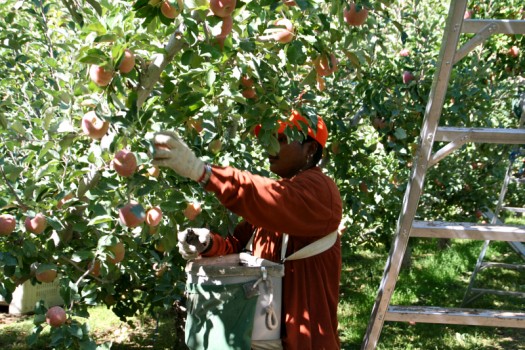A fascinating collection of interviews, documents, and reports on rural workers from Puerto Rico in the United States, “How to Pick Apples: Colonialism and Citizenship in the Formation of Puerto Rican Migrant Farm Labor” is part of a book project on the experiences of Puerto Rican farmworkers in the United States. In a presentation at The Advanced Research Collaborative (ARC) on Thursday, October 2nd, professor Ismael García Colón shared with the audience the first results of his ongoing research.
Instead of looking at Puerto Rican farmers only from the perspective of transnationalism and migration policies, García Colón considers the group as part of the history of U.S. farm labor. The contrast between Puerto Ricans (as U.S. citizens) and guest workers from countries such as Jamaica and Mexico (frequently holding H-2 visas) raises questions of labor policies, state-formation, and practices of citizenship.
Professor García Colón focused on the lives of Puerto Rican apple pickers in the 1960s and 1970s, but the evidences presented suggest that some fundamental questions can be extended to Puerto Rican rural workers in the United States, in general. How conflicting classifications of nationalism, and citizenship impacts labor relations? What are the rights and working conditions of U.S citizens and guest workers, and in what category Puerto Ricans fit (in theory and in practice)? How Puerto Rican and U.S. governmental policies relate to everyday forms of labor relation? And what role nationalism plays in such dynamic?
The presentation began with the narrative of a New England apple grower who fired a group of Puerto Rican workers who complained about working conditions, wages, and working benefits. García Colón suggests that the episode is part of “a series of escalating events that accelerated the demise of Puerto Rico’s farm labor program.” He goes back to the Immigration and Naturalization Act of 1952, which reaffirmed to Puerto Rican U.S citizenship, a status granted in 1917 as a result of the Spanish-American War.
The brief history of U.S. migratory policy towards Puerto Ricans is the first step to understand how U.S. colonialism (the author uses, here, Eric Wolf’s concept of structural power) shaped Puerto Rican migration. It is interesting to notice that the author reinforced the application of the term “migration,” instead of “immigration,” during the presentation. García Colón claims that transnationalism is not enough to understand how Puerto Ricans participated of U.S. legal and political structures. It is necessary to smoke out the limits of citizenship, and how apple growers and other workers perceived this group.



